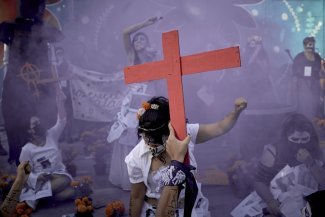
Malawians will take to the streets on Thursday to protest against the high cost of living that has seen the price of basic commodities increasing on an almost weekly basis.
The Consumers Association of Malawi (CAMA), organisers of the mass protests, blame President Joyce Banda for instituting economic reforms dictated by the International Monetary Fund (IMF) without finding means to cushion the poor.
President Banda succeeded late President Bingu wa Mutharika – a professorial but temperamental economist – in April 2012 and instituted the reforms in a last ditch attempt to heal the tattered economy of the landlocked southern African country, which is one of the poorest in the world.
Among other measures, her government devalued the Malawian kwacha by 49 per cent and further floated the currency against the US dollar.
But this caused traders to hike prices.
For example maize, Malawi’s staple food, which was selling at K2,500 (US$7) per 50kg bag before the reforms is now going at K4,500 (US$12.8) while fuel has shot up from K380 (US$1.1) to K600 (US$1.7) per litre, which is unaffordable for many.
Employers did not adjust workers’ salaries despite the price hikes leading to a wave of industrial strikes as the employees demanded higher wages.
According to the most recent World Bank data, gross national income per capita is just US$390.
This is what forced consumer rights activists to call for mass protests on January 17 while branding President Banda – who is only Africa’s second female Head of State – as a puppet of the IMF and donors.
In their petition the organisers have called for a reversal of the floatation of the local currency, a reduction of both local and international travel by the President as well as having her declare her assets.
But President Banda, speaking in a live interview with this reporter on New Year’s Eve, stood her ground on the reforms.
“We have already endured a lot and we can’t give up now when we are about to see the results of these economic reforms,” said President Banda.
Support
Her stand was bolstered a week later when IMF Chief Christine Lagarde visited Malawi and met the private sector urging them the need to stay on course with the reforms.
The IMF and the donor community considers President Banda, a former gender activist, as their darling and have vowed to support her as she implements the reforms to ‘cure’ Malawi’s economy.
Just last week, Malawi’s major donors, under the Common Approach to Budget Support (CABS) issued a statement last week saying that they fully support the reforms and are siding with the President.
Apart from the support from the donors, major civil society organisations that championed the July 2011 protests against the late President Mutharika have backed off from the protests giving President Banda a sigh of relief.
Trade unions too have backed off, raising doubts if the January 17 protests will have any impact considering the divisions that are getting wider daily.
“We are not part of this because we want to give chance to the reforms,” Chauluka Muwake, President of Malawi Congress of Trade Unions told Malawi’s Daily Times recently.
The respected Public Affairs Committee (PAC), a grouping of various faith groups – which endorsed the July 2011 mass protests – are also staying away.
Street vendors too, always at the forefront during such protests, are staying out of Thursday’s protests.
The divisions are taking off the steam, especially with late calls from the chairperson of the Organising Committee McCitings M’doka for a dialogue.








